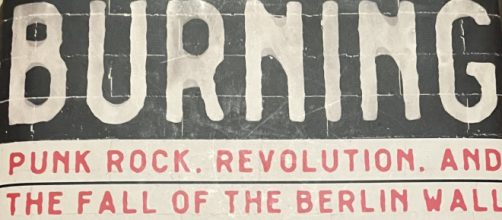Not long ago while foraging around a secondhand bookshop in Sydney’s inner west I came across a book called "Burning Down The Haus" by Tim Mohr. Mohr a New York City-based author and former Berlin DJ fell in love with the Berlin punk nightlife in 1992. He interviewed Berlin punks who faced oppression from the Stasi when in its eyes their alternative clothes were considered a potentially dangerous form of resistance.
Mohr describes how it all started with a small group of East Berlin teens who after hearing the Sex Pistols on a British military radio broadcast to West Berlin and ending with the collapse of the East German dictatorship.
“When they started putting these bands together, they were doing it all in German and it was all about their own lives. British punks were singing about their futures and socio-economic conditions, while the problem in East Germany was almost the direct opposite; they had too much future. There was no unemployment in East Germany, and their lives were scripted by the party,” Mohr told Dazeddigital.com in a 2019 interview.
The idea of punk was liberating – the punk image with the rejection of society and the DIY approach to building a new one in their oppressive surroundings, where one’s future was determined by a communist apparatchik, punk constituted a revolution in itself. Mohr describes how a lot of the bands got together, interviews with many band members who describe the trouble they went to to find good rehearsal space where the police weren’t going to stop them.
Their concerts where held in obscure places, anywhere the Stasi couldn’t shut them down. As a punk from way back I appreciated his understanding of the culture and the movement that developed during this time.
As the emerging punk bands became more visible, the security forces - which in included the most feared Stasi targeted them. They were spied on by friends and family, expelled from schools and many lost their jobs. Some were imprisoned and beaten. But instead of conforming, the punks fought back, playing an important role in the underground movement that was part of the tearing down of the Berlin Wall. Nevertheless, Mohr is rather over-enthusiastic in laying at the feet of punk the wall’s demise.
A Berlin punk talks
Some time after I’d finished the book I had a chance encounter with a neighbour from Germany, Lilly, who when I told her about the book said her mum had been a punk in East Germany during the time of the wall. Speaking to Lilly's mum, 56-year-old Ina about her East German punk years. “My first contact with punk was with sweet 16,” she says. She attended many punk gigs, “Some were illegal. The problem with the concerts was, that you were only allowed to play with a license. However, the authorities did not give this license to punk bands, because they did not conform to the system. So impossible. We ran away from the cops because some concerts were in secret locations. The problem wasn't just the police, but also the Stasi, they were everywhere.
Unfortunately also among the punks.” She remembers seeing one of the great punk bands of that time, Schleim-Keim in a cellar in Erfurt under a museum. It’s still a music cellar today. Hailed as one of the most important and influential punk bands of the former East Germany. Schleim-Keim play raw punk rock (check out their song "Norm" on YouTube), as did many other German punk bands at that time who were influenced by the likes of Sex Pistols and Dead Kennedys and Crass. The band dissolved in 1996. After the end of Schleim-Keim, the two remaining members Mario Lippmann and Hagen Schröder founded a grindcore/punk band named Aggressive Scum. If there ever was a more perfect name for a punk band, Aggressive Scum was it!
A new punk movement is needed
In "Burning Down the Haus" Mohr sums up, declaring that "..the spirit of East Berlin punk rock lives. The ethos of East Berlin punk infused the city with a radical egalitarianism and a DIY approach to maintaining independence - to conjuring up the world you want to live in regardless of the situation or surroundings." He goes onto to state that "Berliners today still fight for the right of self-determination with a seriousness not seen in other Western cities." By saying this in some way he misses the meaning of punk, these East Berliners were revolutionaries and did it by latching onto the punk culture already ripe in the UK. It suited their fight, punk for them meant they were giving the finger to the wall in a loud and obnoxious way.
Punk to the kids in the UK was a defiant anti-society gob. The music was mainly tuneless, with a lot of screaming and thrashing about. It has since evolved into New Wave and the likes of New Order. But it’s still there waiting for another youth revolution, I won’t be happy until I see a punk movement grow in Putin’s Russia. Those kids would have to be very brave, as brave as the East Berlin punks – if not more. Anarchy in Russia! Yeah!


